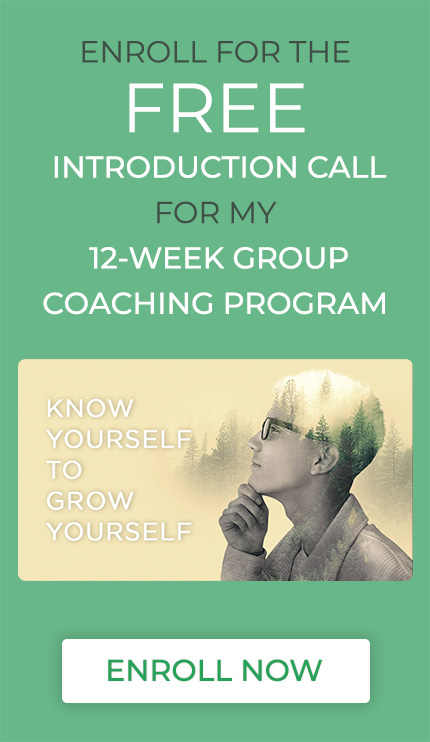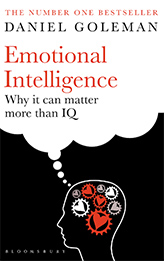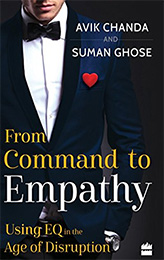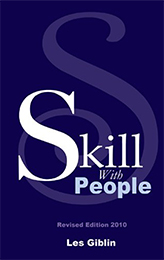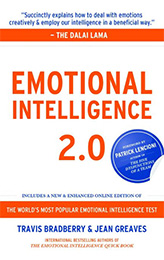Let me tell you a little story about the importance of emotional intelligence.
A dynamic young man in his early 30s – focused, smart, a perfectionist, and a stickler, is the country head for an Indian subsidiary of an MNC. He has all the company perks and thinks he has made it. He’s aggressive, shouts and throws things at people. In essence, he’s brash and he doesn’t care.
On a particular day, a junior colleague makes a mistake. He loses it. He reprimands her in front of several other colleagues, and shouts at her, “just stay at home and help your mother in the kitchen if you can’t do your work properly”. The girl is offended, tears start rolling down her cheeks. The rest of the colleagues disappear from the scene.
He goes home and narrates the story to his wife. She asks him “do you know that you could be fired under the grounds of sexual harassment?”. That is when he realizes the damage he has done.
He reaches the office the following morning, calls the girl into his cabin and says, “I am sorry I shouted at you. I shouldn’t have done it”. She looks at him stoically and says, “if I had the luxury of staying at home and helping my mother in the kitchen, then I would never work for a person like you” and walks out.
This raises the question – what’s the problem with this young man?
The answer’s simple. He lacks Emotional Intelligence.
Now, what is emotional intelligence and what makes it so important?
Before getting to understand emotional intelligence, let’s understand what “emotion” and “intelligence” are.
Emotion is a wide range of observable behaviors, expressed feelings, and changes in the state of the mind and body. Our feelings, likes, and dislikes, give our individual lives meaning and cause us to be happy or unhappy.
Intelligence is the ability to acquire and apply knowledge and skills.
Therefore, Emotional Intelligence, or Emotional Quotient (EQ), is the ability to deal with oneself and other people successfully. It is the ability to recognize our own emotions, the emotions of others, and be able to adapt accordingly.
Let me briefly explain to you how the concept of emotional intelligence came into the mainstream.
The term “emotional intelligence” was used for the first time in 1964 by Michael Beldoch in a paper. In 1966, B. Leuner mentioned it in a paper titled “Emotional intelligence and emancipation”, published in the journal: Practice of child psychology and child psychiatry.
A psychology professor by the name Stanley Greenspan developed his model of emotional intelligence in 1989. Peter Salovey and John Mayer, two American psychologists, introduced theirs in 1990 and they described emotional intelligence as “the ability to monitor one’s own and other people’s emotions, to discriminate between different emotions and label them appropriately, and to use emotional information to guide thinking and behavior”.
The term gained immense popularity in 1995 through Dr. Daniel Goleman and his book Emotional Intelligence: Why It Can Matter More Than IQ.
According to Dr. Goleman, there are five elements that contribute to your emotional intelligence:
1. Self-Awareness
Self-awareness is your ability to recognize and understand your own moods, motivations, abilities and understanding how they impact others. In order to achieve a state of complete self-awareness, you must be able to monitor your emotional state and identify your emotions. Traits like confidence, the ability to laugh at yourself and your mistakes, and the awareness of how others perceive you, exhibit your emotional maturity.

How Do You Know If You’re Self-Aware?
If you are able to read others’ reactions to your behaviors and responses, and understand how they perceive you, then you have high self-awareness.
Self-Awareness: Recognition of one’s own emotional state.
2. Self-Regulation
Self-regulation is your ability to control your impulses, to think before you speak or react, and to express yourself appropriately. It’s your ability to take responsibility for your actions, being able to adapt to change, and the ability to respond appropriately to other people’s irrational emotions or behavior defines emotional maturity.

How Do You Know If You’re Self-Regulated?
If you are able to stay calm and composed when someone screams at you, then you have high self-regulation. It means that you understand that person is angry at someone or something else, but taking out the frustration on you.
Self-Regulation: Controlling or redirecting disruptive impulses and moods.
3. Motivation
Motivation is about your interest in learning and improving yourself. Your grit and determination to keep going when you face challenges in your life. It is about setting goals and following through with them. If you have traits such as having initiative and the commitment to complete a task, and having perseverance in the face of adversity, you fall under this category.

How Do You Know If You’re Motivated?
If you are the kind of person who sets a goal like “I want to become fit because I feel good about myself” instead of a goal like “I want to become fit because I want to impress people around me”, then you are high on motivation.
Motivation: Relishing achievement for one’s own sake.
4. Empathy
Empathy is your ability to understand other people’s emotions and reactions. You can empathize with others only if you become self-aware. You must understand yourself before you can understand anyone around you. Traits such as perception of others, being interested in other people’s worries and concerns, the ability to anticipate someone’s emotional response to a problem or situation, and the understanding of society’s norms and understand the reason behind people’s behavior fall under this.

How Do You Know If You’re Empathetic?
If you are able to understand and cope with someone else’s feelings or fully understand yourself and know the reasons as to what makes you feel what you feel, then you can relate to others and are empathetic.
Empathy: Understanding other people’s emotional makeup.
5. Social Skills
This is your ability to pick up on jokes, sarcasm, customer service, maintaining friendships and relationships, and finding common ground with others. Skills such as good communication, good time management, managing or leading a group of people, negotiation, persuasion, and conflict resolution fall under this.

How Do You Know If You Have Good Social Skills?
If you are able to help people find common ground, and resolve conflicts between them without any authority, then you have great social skills.
Social Skills: Building rapport with others to move them in desired directions.
So, why is emotional intelligence more important that IQ? Let’s go back to the incident I narrated in the beginning. What do you think happened with the young executive?
He was almost fired from his job. Fortunately, the senior management let him off with a warning and advised him to get professional help. He found himself a coach who helped him work through his emotions, improve his EQ and get himself out of trouble over a period of time.
The person in this story was me. This happened over 20 years ago. Don’t worry though, the girl ended up becoming one of my closest friends very soon after the incident.
I was lucky! Not everyone would have similar luck for that sort of behavior.
You would have come across some people in your life who are academically brilliant, and yet, fail in their personal and professional lives.
Your intelligence quotient (IQ) alone isn’t enough to achieve success in life. Of course, your IQ can help you get entry to college and work. However, it’s your emotional intelligence that will help you manage the stress when you face exams and manage the pressure at work. You are better off when your IQ and EQ build off one another.
Summary
Emotional intelligence, or EQ, is your ability to understand, use, and manage your own emotions in positive ways. It’s what helps you to connect with your feelings and turn your intentions into actions. EQ helps you build stronger relationships, succeed in your academics, your personal and professional life, and your overall life goals.
According to Dr. Daniel Goleman, there are 5 elements that contribute to your emotional intelligence:
1. Self-Awareness: this is your ability to recognize and understand your own moods, motivations, abilities and understanding how they impact others.
2. Self-Regulation: this is your ability to control your impulses, to think before you speak or react, and to express yourself appropriately.
3. Motivation: this is about your interest in learning and improving yourself, your grit and determination to keep going when you face challenges in your life.
4. Empathy: This is your ability to understand other people’s emotions and reactions.
5. Social Skills: This is your ability to pick up on jokes, sarcasm, customer service, maintaining friendships and relationships, and finding common ground with others.
Emotional intelligence is more important than IQ because no matter how smart you are, your IQ can only take you so far in your personal and professional life. Your EQ is what will take you further beyond. So, focus on working on your EQ as well.
Here’s the link to a free online test that can determine your EQ. Give it a try!



